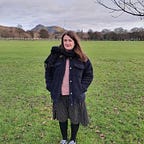I went to my first session of PTSD group therapy and hated (almost) every second
I’m sitting in a stuffy waiting room. The friendly receptionist welcomes each nervous-looking visitor with a smile, directing them to sit down. My hands are already sweating from a combination of nerves and the medium Starbucks I’m drinking. The coffee is bad, as Starbucks usually is, but I just wanted something to grip on to. I quit smoking years ago, so it was this or an Irn-Bru, and I didn’t want to gurgle my way through the first session.
The receptionist strides over to the radio and turns it on. I think it’s Heart FM. It’s turned up way too loud. Craig David is playing. The woman opposite me scowls and puts her headphones back in.
A tall, slim woman with fluffy hair and a floral dress walks into the room and says, “if you’re here for the course, please follow me.” We’re led upstairs and I can’t help but think I should have just taken the lift rather than lose my breath even more. We find the right room and sit down at a table more suitable for people who actually know each other. And aren’t stressed. And don’t feel like they want to throttle anyone who breathes near them.
Looking around, most of the group are women under 40. One of them has a carer with her. The only man sits across the table from me and when asked what he’s struggling with he writes down on a post-it note: “fire”. I’m wearing a band tshirt with a burning building on it. I feel stupid. I start to sweat even more.
The other post-it notes are to be expected. We write down the set menu of PTSD symptoms: anger, panic attacks, flashbacks. The constant feeling of dread. Extreme reactions. Withdrawal. Depression. Feeling suicidal.
We’re taken through a small print out, full of clip art and bad memes, that explains why we feel stressed. Fight, flight, freeze. Adrenaline. Serotonin. It’s the sort of thing you might read in your first psychology A level lesson and all I want is to screw up the piece of paper and chuck it at the therapist’s head.
She shows us a picture of a scan of a brain with PTSD and one without. The one without lights up; the one with is dark and gloomy. Some people breathe a sigh of relief as they’re told that, following one traumatic event, the brain can recover and “return to normal”. I ask what happens if you don’t remember ever being normal; the prognosis isn’t so great.
Two of the women insist on making a comment on everything anyone says. They’re nodding and shaking their heads in competition with one another, desperate to be the star pupil in this classroom of misery, and don’t stop questioning everything anyone says. “Doesn’t serotonin help you sleep?” “Is hypervigilance the same as hyperarousal?” They’re relevant questions, but I wish they’d shut up.
Nobody wants to be there. I certainly don’t. I want to get better, of course — I’ve never wanted anything more. But I’ve been on these courses before. Last time I was sent on one for Generalised Anxiety Disorder and had a full-on breakdown as everyone else sat around clutching cups of tea, sharing tales about how they were too nervous to walk to the shops. I learn things I’ve known for years and I’m spat out at the end of it feeling just as, if not more, frustrated.
Before long, the therapist asks us what our key takeaways from the session are. As much as I don’t want to be in the room, I’m shocked that it’s already finished. Before she can open her mouth to explain the breathing exercise she’d like us to try, I stand up from my chair, calmly walk out of the room and — as soon as I’m outside — let out a howl.
I crumple on the ground. Is this really what I came here for? Am I actually missing work for this? I’m angry, sad and fed up, all at once. I want to scream, I want to cry, and I do — for the next ten minutes. The community support worker, who had been supervising the session — presumably in case something like this happened — follows me out.
She sits me down and I — at this point feeling as though I have literally nothing to lose — fill her in on my frustration. I’m sick of being ignored, and I have. had. enough. of an assumption being made that I’m fine because I take my antidepressants like a good girl every day and more often than not make it into work.
I ready myself for inspirational quotes about recovery and moving forward, but that’s not what I get. She looks at me right in the eye and says, “there is so much fucking shit in this world that we have to deal with every day and you have had to deal with more of it than most. Whatever happens, whatever you take away from this session, please always remember: be kind to yourself.”
I’m going back next week. I’ll skip the coffee this time.
